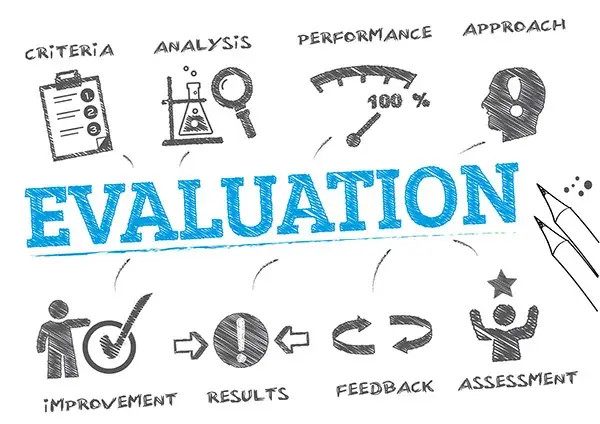Evaluation
The program was evaluated on a continuous basis over its whole execution timeline. This was accomplished as a result of the project. Minor changes were made, with the goal of making all organizations and participants feel "comfortable" with all of the project's activities throughout the course of 14 months. As a result, it was assured that the overall project's fundamental idea remained stable and did not alter. All of the activities that were held were listed on the timetable and the call for partner organizations that was attached to the application. If the evaluations showed that amendments were needed on the application, the National Agency was contacted first to see if they agreed and approved the adjustments. The evaluation findings were posted on the program's website.

The evaluation was separated into the following sections:
(a) The initial evaluation took place in October - November 2024, respectively, through a discussion in an online meeting (OM) with the representatives of the organizations and the participants of this project. The entire program's timetable was reviewed and evaluated as an idea in this examination. As a result, if a positive appraisal was received, all opted to preserve the program as it was shown on the schedule in order to achieve their acceptance and unanimity.
(b) The participants did the next evaluation (middle evaluation) during the opening days of the PDA in Poland in January 2025. This evaluation was carried out through a conversation on the third day of the training, during which adjustments the participants advised to make their stay in the lodging and working area more comfortable were discussed. In this middle evaluation of the training, questions were raised about what they liked and did not like, what they expected as educational results, what they thought about the entire organization up to that point, and whether there was anything that bothered them, in order to proceed to the necessary changes through discussion. All actions taken by the participants and organizations were considered.
(c) On the conclusion day of the activities (08 of January 2025), an online questionnaire with multiple choice responses and open type questions for each activity and the entire project was used to conduct a second evaluation from the participants. The findings of this evaluation were scrutinized. The assessment report was discussed by all of the trainers and organizers of the training in order to improve future comparable training events. The results of this evaluation you can find it in the following file:
(d) In addition to the foregoing, a more accurate evaluation was done through a general report that was produced by all organizations to review their activities, as well as the meeting site, meals, social events, and generally all the logistics and all the stages. The organizations were evaluated based on the reporting and distribution of program results that participants did in their home countries.
(e) Another evaluation from participants took place after the end of the second PDA in April 2025 in Cyprus (last day of the activities at 18 of April 2025) in order to evaluate all of the project's activities and procedures, as well as hosting and working spaces in both PDAs. Here you can find also the evaluation of the second PDA in the following file:
(f) One more evaluation from the participants was conducted through their general report, which was given to the organizers following the completion of all project activities (during the 14-month period). Given that the participants were active throughout the program, their opinions and evaluations were considered more reliable, and the final assessment was received through this final report from them.

(g) In addition to the evaluation reports, all organizations were requested to write their own assessment letters, which were evaluated by the participating organizations for the entire project's implementation. Furthermore, as part of the Youthpass framework, participants were able to self-evaluate the project's outcomes. This evaluation took place one month after the workshops concluded. Participants had removed themselves from the educational process, giving them a more objective view of their learning achievements.
The questions that had to be answered were related to the achievement of learning objectives, skills, and personal development obtained during the program. The organization received numerous opinions as a result of the aforementioned evaluations, and efforts were made to improve in future applications, to be more active and sensitive in various areas, and to address current weaknesses.

